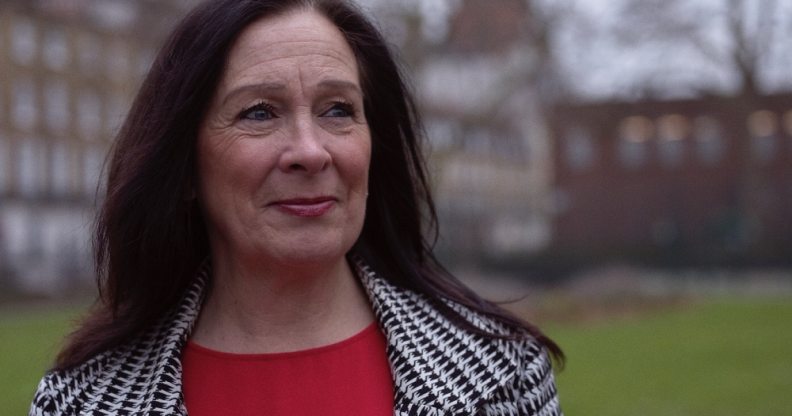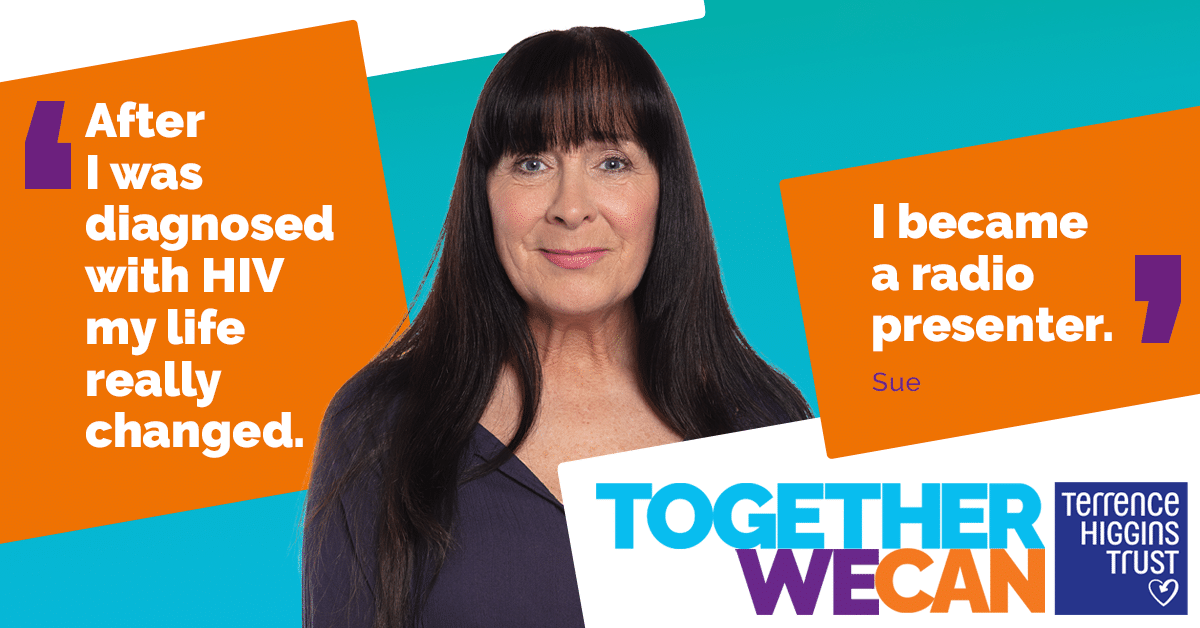More straight people being diagnosed with HIV than queer men: ‘I didn’t think it could happen to me’

Sue Hunter. (Terrence Higgins Trust)
The number of straight people being diagnosed with HIV is higher than that of gay and bisexual men for the first time in a decade, new figures show.
Statistics released by the UK Health Security Agency show that straight people made up almost half (49 per cent) of all new HIV diagnoses in England in 2020. Gay and bisexual men accounted for 45 per cent of new diagnoses.
Experts are warning that the true number of straight people contracting HIV is likely even higher. Due to the coronavirus pandemic, there was a 33 per cent drop in heterosexuals being tested for the virus in sexual health services in 2020. That’s compared to a seven per cent drop in HIV testing for gay and bisexual men.
When population size is taken into account, gay and bisexual men are still more likely to contract HIV than their straight counterparts – but health outcomes are not the same across the board. Straight people with HIV are significantly more likely to be diagnosed late, meaning they’re more likely to pass it on through sex.
New figures released by the UK Health Security Agency show that 51 per cent of women, 55 per cent of heterosexual men and 66 per cent of those aged over 65 were diagnosed at a late stage in 2020. By comparison, just 29 per cent of gay and bisexual men were diagnosed late.
‘Massive misconceptions’ about HIV almost stopped Sue Hunter from getting tested
Sue Hunter is one of the many straight women who are living with HIV in the UK today. She was diagnosed 15 years ago after she entered into a new relationship following a divorce. Looking back, she says she almost didn’t get tested because she had “massive misconceptions” about HIV.
“I’d come out of a marriage, I started again, I was only 45 and I met a new partner. We had a lovely relationship for about a year but I decided I wanted to go my own way after the divorce and all that, so we separated but we stayed friends,” Sue tells PinkNews.
Shortly after they separated, Sue’s former partner started developing persistent chest infections. He eventually ended up being hospitalised for pneumonia, which led to him testing positive for HIV.
“Once he mentioned those three letters, I was like: ‘Why is he talking to me about something like that?’” Sue says. She had always thought that, as a straight woman, she wasn’t at risk of contracting HIV.
“He walked out the door and one of the last things he said to me was: ‘Please go for a HIV test.’ Obviously I did and I got my result, and it was positive.
“The first thing I thought was: ‘HIV doesn’t happen to women for a start, and certainly not to heterosexual women.’ I contacted the Terrence Higgins Trust and started to inform myself, and I learned that it does happen to women and it does happen to heterosexuals.”
In the months afterwards, Sue descended into shame and stigma over her diagnosis. Eventually, she came to realise that she had just been “unlucky”.
“I didn’t use protection because I thought: ‘Well I’m going through menopause and STIs happen to young people.’ Again, it’s those misconceptions.”
Sue’s family were shocked when she told them about her diagnosis – like many others, they wrongly assumed it was a virus that only affected gay and bisexual men. The stigma resulted in her keeping her status a secret from her daughter for years.
If you look at the statistics, a third of people living with HIV in the UK are women, and 52 per cent of people with the virus worldwide are women.
“I’ve had relationships since and some people have walked away from me. I remember a guy said to me once when I told him I was positive after a couple of dates: ‘I value my life too much to have a relationship with you.’”
Sue is urging other straight people who are sexually active to get tested for HIV – she says she had “no signs or symptoms” that she had contracted the virus before she got her diagnosis.
“Don’t sit on the sofa waiting for someone to knock on your door,” she says. “I was lucky that the partner I had was a nice guy. He didn’t have to tell me – he did it because he was a nice guy.
“HIV does not discriminate. I’m a woman living with HIV for the last 15 years, and if you look at the statistics, a third of people living with HIV in the UK are women, and 52 per cent of people with the virus worldwide are women.
“The best thing you can do is know your status. If you’re sexually active and you haven’t had a HIV test for a while, go and get one.”
There’s been a ‘steep decline’ in HIV transmission among gay and bisexual men
Alex Sparrowhalk works on the health improvement team at the Terrence Higgins Trust. He says the statistics around HIV are changing partly because there’s been such a steep decline in the numbers of gay and bisexual men contracting the virus.
“Within the past decade, we’ve had significant increases in the number of people testing for HIV, but especially among gay and bisexual men,” he explains.
“There are also other factors such as treatment and prevention. People living with HIV are now starting treatment as soon as they’re diagnosed, and that means they can’t pass it onto their sexual partners once they have an undetectable viral load.
“We also have the impact of PrEP, and we know that the significant majority of people taking PrEP are gay and bisexual men. Among heterosexuals, by and large, uptake is much lower. We’re still doing a lot of work to engage with heterosexuals who could benefit from PrEP to make sure they know about it, how it works, and to talk to them about their concerns.”
It’s really important to note that the vast majority of tests will come back negative.
Like Sue, Alex is calling on anyone who’s sexually active and hasn’t been tested for HIV recently to get tested.
“There’s still a myth that HIV is a gay condition or illness – it’s still perpetuated unfortunately,” Alex says. “But HIV is a virus that can affect anyone.”
“It’s really important to get tested if you’re sexually active, but especially if you’re having sex with multiple partners or multiple partners at the same time, that increases your need to test for HIV. All sexually active people should be getting tested at least once a year.
“It’s really important to note that the vast majority of tests will come back negative, but also for those who test positive it’s important that people know that treatment works. It’ll enable you to live a long life – it doesn’t stop you from doing anything you want to, and it means you know you can’t pass it on to your sexual partners.”


